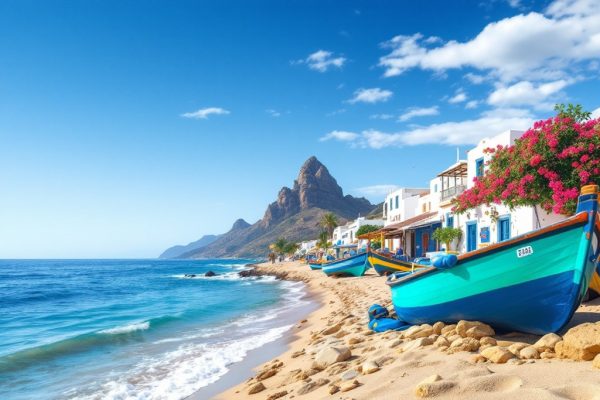Where to Travel during a Hurricane Season: Safety Tips
Planning a trip during hurricane season? The Atlantic hurricane season lasts from June 1st to November 30th, posing risks to travelers. Hurricanes can cause flight cancellations, cruise disruptions, and dangerous weather conditions. Learn how to stay safe by monitoring forecasts from the National Hurricane Center, preparing a disaster supply kit, and understanding evacuation procedures. Discover safe destination alternatives and get essential travel tips for a worry-free vacation. Read on to protect your trip and ensure your safety during hurricane season.
Important information

- Atlantic hurricane season lasts from June 1st to November 30th.
- Hurricanes pose serious risks to travelers, including flight disruptions, infrastructure damage, limited access to essential services, and dangerous weather conditions like storm surges, high winds, and flooding.
- Travelers should monitor the National Hurricane Center for updates, prepare a disaster supply kit, consider travel insurance, and learn evacuation routes.
- If in a hurricane’s path, heed evacuation orders immediately and seek higher ground.
- Safer destinations during hurricane season include the Pacific Northwest, inland Canada, Northern California, the Mediterranean, and some Southern Caribbean islands.
Understanding Hurricane Season
The Atlantic hurricane season spans from June 1st to November 30th. This is the period when hurricanes are most frequent. Travelers should consider these dates when planning trips.
Impact of Hurricanes on Travel Plans
Hurricanes can severely impact travel plans, leading to flight cancellations and cruise disruptions. This dangerous weather poses risks to travelers, so staying updated on hurricane forecasts and heeding local advisories is crucial for your safety. If a hurricane threatens your trip, contact your airline or hotel to discuss rescheduling or alternative arrangements. Here’s what you should do:
Monitor hurricane forecasts: Stay informed about potential hurricanes through reliable sources like the National Hurricane Center.
Sign up for travel alerts: Subscribe to alerts from your airline, cruise line, or hotel for updates on potential disruptions.
Contact your travel providers: If a hurricane is predicted to affect your destination, reach out to your airline, cruise line, or hotel to discuss your options. They may offer waivers for rescheduling or refunds.
Review your travel insurance: Check your policy to understand what coverage you have for hurricane-related disruptions. Some policies offer trip cancellation or interruption benefits.
Pack essentials: If you’re traveling during hurricane season, pack essential items like a first-aid kit, flashlight, and extra batteries.
Travel Safety During Hurricane Season
Traveling during hurricane season demands careful planning with safety as the top priority. Closely monitor the National Hurricane Center for updates and alerts. Prepare a disaster supply kit with essentials like water, non-perishable food, a flashlight, and a first-aid kit. Travel insurance covering hurricane-related disruptions is highly recommended. Know the evacuation routes and procedures. Choose sturdy accommodations, preferably inland and away from the coast. Keep your loved ones informed about your location. Flexibility is essential, so book refundable flights and lodging. If a hurricane warning is issued, follow the advice of local authorities; your safety is paramount.
Choosing Safe Destinations
Escape the hurricane season by choosing a safer destination. Consider these options:
North America
- Pacific Northwest (Washington and Oregon): a haven rarely touched by hurricanes.
- Inland Canada: offers excellent refuge from hurricane threats.
- Northern California: known for milder weather during hurricane season.
- Inland US destinations: areas far from the coast provide additional safety.
Safety Tips for Traveling During Hurricane Season
Travel insurance is a worthwhile investment that safeguards your trip against unexpected disruptions, such as hurricanes.
Should You Purchase Travel Insurance?
Protect your trip from hurricane-related disruptions with travel insurance. It covers cancellations, interruptions, and delays, reimbursing you for prepaid expenses like flights and accommodations. This financial safety net can also cover medical emergencies and evacuations, but coverage details vary. Always review your policy to understand its provisions for natural disasters.
How to Stay Informed About Hurricanes
Stay informed about weather conditions by checking reliable sources such as the National Hurricane Center and the World Meteorological Organization. Using weather apps and signing up for phone alerts will provide real-time updates. Follow local news and official social media channels for updates from local authorities. Keeping in touch with family and friends back home allows them to monitor the situation and provide additional information. Here’s how to stay informed:
- Consult reliable sources, such as the National Hurricane Center and the World Meteorological Organization.
- Use weather apps and sign up for phone alerts to receive real-time updates.
- Follow local news and official social media channels for updates from local authorities.
- Keep in touch with family and friends back home so they can monitor the situation and provide additional information.
What Are Evacuation Procedures?
Storm Preparation and Emergency Planning
Pack smart for your trip by bringing key safety items:
- A first-aid kit,
- A flashlight with extra batteries,
- Non-perishable food and water,
- Important documents (stored safely in a waterproof bag),
- A portable charger for your electronics,
- A whistle (useful in emergencies).
A pre-packed disaster supply kit is also a wise precaution, especially with the unpredictable nature of hurricanes. This kit offers essential resources during power outages and evacuations, enhancing both your safety and preparedness.
What Should Tourists Pack for Safety?
When a hurricane approaches, prioritize your safety. Pack essential items such as:
- a flashlight,
- a small radio,
- bottled water,
- non-perishable food,
- a first-aid kit,
- a road map with evacuation routes, and
- a portable phone charger.
A portable phone charger could prove invaluable.
Why Keep a Disaster Supply Kit Ready?
A hurricane survival kit is crucial for providing essential resources, such as food and water. A well-stocked kit also includes other emergency supplies, increasing your safety and preparedness for weathering the storm. Having a hurricane survival kit is vital for your safety during a hurricane.
Evacuation and Shelter Recommendations
Evacuation planning is critical for coastal safety. Tourists and residents should identify safe routes inland, away from coastal hazards. These designated escape paths are typically marked by local authorities. Familiarize yourself with these routes and the locations of emergency shelters, often established in sturdy buildings like schools and community centers. For shelter information, contact your local emergency management agency or check their website. Prepare an emergency kit containing essential supplies.
Essential Actions During a Hurricane
Heed evacuation orders promptly. Storm surges are deadly, presenting an immediate threat. Never underestimate their destructive power.















